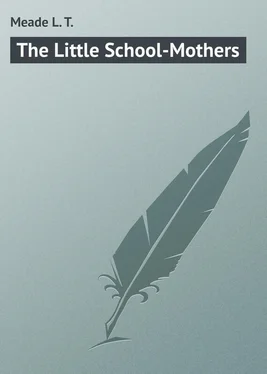L. Meade - The Little School-Mothers
Здесь есть возможность читать онлайн «L. Meade - The Little School-Mothers» — ознакомительный отрывок электронной книги совершенно бесплатно, а после прочтения отрывка купить полную версию. В некоторых случаях можно слушать аудио, скачать через торрент в формате fb2 и присутствует краткое содержание. Жанр: foreign_prose, foreign_children, на английском языке. Описание произведения, (предисловие) а так же отзывы посетителей доступны на портале библиотеки ЛибКат.
- Название:The Little School-Mothers
- Автор:
- Жанр:
- Год:неизвестен
- ISBN:нет данных
- Рейтинг книги:5 / 5. Голосов: 1
-
Избранное:Добавить в избранное
- Отзывы:
-
Ваша оценка:
- 100
- 1
- 2
- 3
- 4
- 5
The Little School-Mothers: краткое содержание, описание и аннотация
Предлагаем к чтению аннотацию, описание, краткое содержание или предисловие (зависит от того, что написал сам автор книги «The Little School-Mothers»). Если вы не нашли необходимую информацию о книге — напишите в комментариях, мы постараемся отыскать её.
The Little School-Mothers — читать онлайн ознакомительный отрывок
Ниже представлен текст книги, разбитый по страницам. Система сохранения места последней прочитанной страницы, позволяет с удобством читать онлайн бесплатно книгу «The Little School-Mothers», без необходимости каждый раз заново искать на чём Вы остановились. Поставьте закладку, и сможете в любой момент перейти на страницу, на которой закончили чтение.
Интервал:
Закладка:
Meade L. T.
The Little School-Mothers
Book One – Chapter One
The Girls of the Third Form
“Robina Starling will arrive at the school this evening,” said Mrs Burton. “She is twelve years old, and has never been at school before. I want you girls of the third form to take her under your charge. Frederica and Patience Chetwold, do you hear? Harriet Lane and Jane Bush, I expect great tact and consideration; don’t forget. And as to you, dear Rose, and you. Cecil and Vivian Amberley, I know beforehand that you are always sweet and considerate to those a little younger and a little more ignorant than yourselves. Robina has been sent from home because of her mother’s illness. She is quite a little home bird, and I have no doubt will be sorry for herself. I have given her people to understand that she will be very happy at school, and I expect you girls of the third form to help me to carry out my prognostications. Now then, I think that is all. We will begin our usual lessons. Miss Sparke, will you take the third form girls for their history? Miss Devigny, the sixth form are waiting for you in the blue parlour.”
A minute later the several girls of Abbeyfield School had dispersed to their different classrooms, and the great hall in which they had assembled for prayers, and afterwards to hear Mrs Burton’s remarks with regard to Robina Starling, was empty. A busy hum of eager voices might have been heard issuing from the different classrooms. It was the subdued hum caused by young people kept in complete order and actively engaged in following the pursuit of knowledge.
Abbeyfield School was situated in the neighbourhood of the New Forest, and was within half an hour by train of Bournemouth. The time was midsummer, and the holidays were not far ahead. The school was a very select one, and did not consist of more than twenty pupils. There was the third form for the girls already mentioned: Frederica and Patience Chetwold, Harriet Lane, and Jane Bush, and the three Amberleys. There was the first form, where the little children played and learned a little and were happy – there were only three little children now in the first form – and then there was the sixth form, where the girls who were considered grown-up pursued their studies. Here might be seen grave Constance Amberley, the sister of Rose and Cecil and Vivian; here, also, were Julia Price and Agnes Winter, and several more, all well-behaved girls anxious to do their duty and to take advantage of the many excellent opportunities offered to them at Abbeyfield.
There were, to all appearance, no really naughty girls in the school, although it is true that Harriet Lane and Jane Bush were not quite so much liked as their fellows. Still, harmony was the order of the hour, and no young people looked happier than these as they went two by two into their pews to the old church on Sunday and appeared now and then at a fashionable flower show at Bournemouth, or – best time of all – played merrily in the fields and lanes which surrounded Abbeyfield.
On the day when Mrs Burton had announced the arrival of Robina Starling, there was to be a picnic, to which every member of the school had been invited. It was a special picnic given by Miss Devigny, the lady who superintended the studies of the sixth form girls. She was to take them to a well-known place called Mark Ash, about six miles away. They were to have a picnic tea, and were not to return home until late. Mrs Burton would not accompany them, but Miss Sparke and Miss Devigny were considered quite a sufficient escort. They would drive to Mark Ash in two waggonettes, and every heart was pit-a-pat with excitement at the thought of their happy afternoon.
Miss Devigny was the sort of teacher whom all girls idolise. It was not that she was exactly beautiful, nor perhaps especially clever, but she had that indescribable attribute which is best known by the word “charm.” Without any apparent effort on her part, she charmed all those with whom she came in contact. Even the dullest pupil brightened and did her best under Miss Devigny’s influence; even the most sulky became good-tempered, and the most secretive became open and above-board. The great inducement for the little girls of the third form to struggle hard and conquer the difficulties of English, French, and German was the hope that they would be moved into Miss Devigny’s class. To work with her in the blue parlour was as good as a holiday – so the girls who were there already affirmed, and so all, without a single exception, believed.
Now, however, there was a new topic of interest. Something very wonderful had occurred. The third form girls were to receive a new companion. For a girl to arrive at the school so late in the term was itself rather remarkable, but for a girl to come and be immediately placed, as it were, in their charge; for a girl to be made over to them so that they alone were to be in a measure responsible for her well-being and happiness, was a state of things which at once dazzled and perplexed them.
During recess that morning the girls of the third form met in a little group to discuss the situation. Even the sixth form girls looked at them with a certain envy, and thought it somewhat strange of Mrs Burton to put this responsibility upon the young ones. The sixth form girls were, of course, much too grand to interfere, but they also were interested in Robina.
“She must be a sort of bird,” said Frederica. “Think of her funny name – Robina Starling.”
“We must not laugh at her,” said Patience; “we must be very careful about her. I wonder at what end of the dormitory she will sleep?”
“There is an empty bed at the far end near me,” said Harriet Lane.
“Oh, she won’t be put there, Harry; don’t you make any mistake,” said Jane Bush. “She is going to be petted and fussed over – I can see that. I know quite well what will happen. She will have the centre bed under the window – that’s the nicest bed of all. You’re in it now, Rose.” Here Jane laughed. “Well, you’ll have to turn out; the bird will want it; see if I am not right.”
“Don’t be nasty,” said Rose. “If I have to turn out, I don’t mind, not one bit. Poor little thing! She has never been at school before, and she is twelve years old. It’s rather nice to have the charge of her; don’t you think so, girls?”
“Yes,” said they all, except Harriet and Jane.
“I do wonder what she will be like?” said Cecil Amberley.
“I know,” cried Harriet. “You mark my words, girls.” Here she pushed herself forward in a silly, aggravating way she had. “You mark my words. There is something queer about that Robina. Why should we receive her in the sort of manner Mrs Burton seems to expect? Why should we be so precious good to her? She must be a weakling; perhaps she is deformed, or has a squint.”
“Oh! Harriet, you don’t think so!” said Vivian Amberley, the youngest of the four sisters, and in consequence the most petted. “I can’t bear girls with squints,” she added.
“But that would be better than having a hunchback,” said Jane.
“She is sure to have something,” continued Harriet. “It may not be either of these, but something. She is small, and ugly, and frightened – that I am certain of. Oh, of course we’ll have to be good to her; but at the same time, what I say is this, girls: we’ll have to let that young ’un know at once that she is not to have her own way about everything.”
“There is something in what you say,” remarked Patience Chetwold; “and although I never quite care for your sort of tone, Harriet, yet I think, too, we must not let the girl rule us all. She won’t love us a bit if we spoil her.”
“Of course she won’t,” said Frederica.
Читать дальшеИнтервал:
Закладка:
Похожие книги на «The Little School-Mothers»
Представляем Вашему вниманию похожие книги на «The Little School-Mothers» списком для выбора. Мы отобрали схожую по названию и смыслу литературу в надежде предоставить читателям больше вариантов отыскать новые, интересные, ещё непрочитанные произведения.
Обсуждение, отзывы о книге «The Little School-Mothers» и просто собственные мнения читателей. Оставьте ваши комментарии, напишите, что Вы думаете о произведении, его смысле или главных героях. Укажите что конкретно понравилось, а что нет, и почему Вы так считаете.












